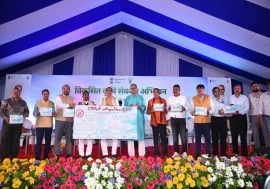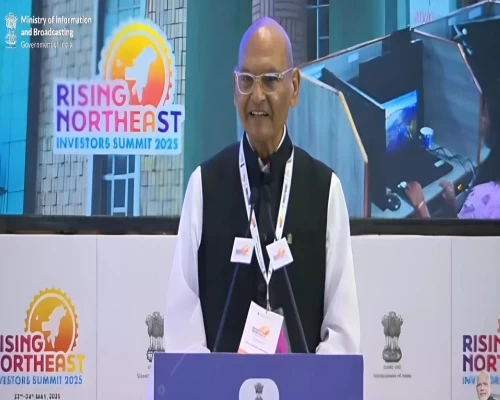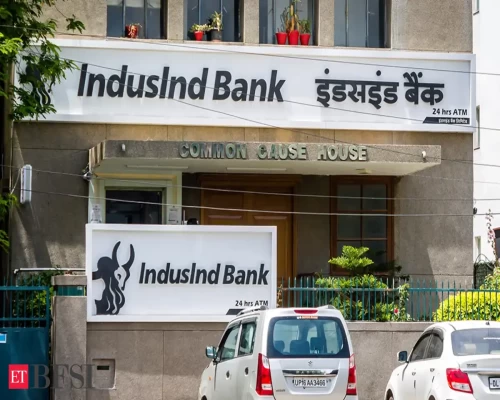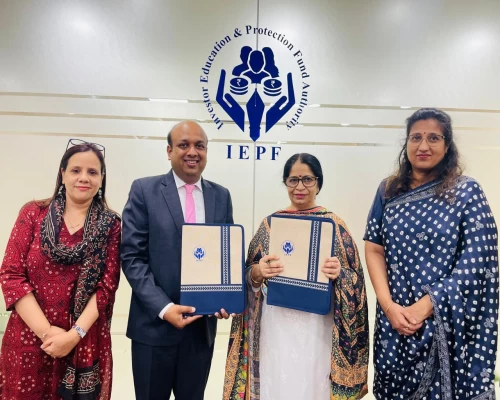
New Delhi: A roundtable consultation was organised today in New Delhi by the School of Business Environment, Indian Institute of Corporate Affairs (IICA), with support from the Office of the Principal Scientific Adviser to the Government of India, on the ‘Research & Development (R&D) Expenditure by top 1,000 listed companies in India’.
This roundtable was organised as part of the ongoing research to consolidate corporate views on R&D expenditure, to sensitise the requirement of investment in R&D for the growth of the company and sustainability in the longer run, and to sensitise the need for R&D-related disclosures. The objective of the roundtable consultation was to seek inputs and obtain feedback from corporate leaders on provisional findings of a research study carried out by the IICA on the R&D landscape in the country.
Delivering the keynote address, Prof. Ajay Kumar Sood, Principal Scientific Adviser to the Government of India, highlighted that a robust and standardised criteria must be adopted for capturing the R&D data. Prof. Sood envisioned a transformation for India—from a service-driven economy to a product-driven one. Prof. Sood said that while services play a crucial role, it is through innovation and product development that we can leapfrog into global prominence. He urged companies to invest strategically in R&D, fostering a culture of creativity and risk-taking. To remain competitive, India must embrace public-private funding models as the bridge to realising this vision of a developed economy. Prof. Sood’s address underscored the urgency of India’s R&D agenda. It is not merely about numbers; it’s about shaping our destiny, fostering innovation, and leaving a legacy for generations to come, Prof. Sood said.
In his address on the occasion, Dr. Ajay Bhushan Pandey, Director General & CEO, Indian Institute of Corporate Affairs, and Chairperson, National Financial Reporting Authority (NFRA), mentioned various examples of international best practices in the R&D domain and shared insights on the history of tax rebates on R&D initiatives in the country. He also highlighted the need and importance of sensitising the corporate sector on the importance of ESG (Environmental, Social, and Governance) and R&D, mentioning that India has successfully established examples by becoming a pioneer in digital infrastructure. Highlighting case studies from countries like South Korea, Japan, China, Singapore, the USA, Israel, and Germany, Dr. Pandey said these countries fostered their R&D sectors and became developed economies. He underscored how adopting ESG reporting frameworks is changing companies' approach towards fostering ESG-led investment practices. Similarly, Dr. Pandey said, it could catalyze similar growth in India’s R&D landscape.
Dr. Parvinder Maini, Scientific Secretary, Office of the PSA, shared her experiences in implementing various initiatives of the Government of India towards the promotion of Research & Development in the country. She reiterated that R&D drives innovation. Dr. Maini stressed increasing private sector participation in R&D investments and asserted that the private sector must step forward as partners in our journey toward technological advancement and sustainable growth. She spoke of collaborative efforts, emphasising the need for a collective commitment to R&D excellence.
Sunil Kumar, Additional Secretary, Department of Science and Technology, highlighted the initiatives of the Department of Science and Technology in capturing the R&D data in the country. Kumar’s call for rational policy-making and better alignment with Indian policies resonated with the audience, and he proposed bifurcating the public-private companies’ database specifically for the R&D sector, enabling targeted interventions and informed decision-making.
In his address on the occasion, Inder Deep Singh Dhariwal, Joint Secretary, Ministry of Corporate Affairs (MCA), carved out the essence of R&D from our ancient roots and stated, “In the timeless tales of the Panchatantra, we find wisdom that transcends centuries. Our ancestors understood the value of knowledge, and they recognised that true progress lies in seeking answers, pushing boundaries, and nurturing creativity.” Dhariwal urged the corporate community to honor this legacy by investing in R&D, not merely as an obligation but as a sacred duty to our nation’s future.
B.N. Satpathy, PSA Fellow, Office of the Principal Scientific Adviser to the Government of India, presented draft findings of the research study carried out by IICA, including trends of R&D expenditure among the top 1,000 listed companies by market capitalization. The research study compares the size of expenditure across companies, sectors, and geographies; the industries and sectors with the highest R&D investment; sector-specific R&D expenditure in sustainability-related initiatives; and recommendations for optimizing investment strategies in R&D.
Dr. Garima Dadhich, Associate Professor & Head, School of Business Environment, IICA, said, “We stand at the crossroads of innovation and sustainability. Our commitment to R&D will shape our destiny, impacting not only our businesses but also our environment, society, and future generations.” Dr. Dadhich outlined the specific objectives of the roundtable, emphasising the need for enhanced commitment, improved reporting practices, collaboration, and long-term impact.
Dr. Ravi Raj Atrey, Chief Programme Executive, School of Business Environment, IICA, facilitated the roundtable. The event was attended by around 50 senior representatives from R&D/Sustainability divisions of different public and private corporate houses.
Some key recommendations from the consultation were to develop a dedicated web portal to manage and track the R&D data on a real-time basis, sensitise corporate functionaries on the importance of R&D, standardise the definition of R&D, consider mandatory R&D disclosures in standard formats, and extend such research to unlisted companies as well.
It is pertinent to mention that the Office of the Principal Scientific Adviser entrusted a research study on the R&D expenditure of the top 1,000 listed companies by their market capitalisation in India to the School of Business Environment, IICA. /BI












